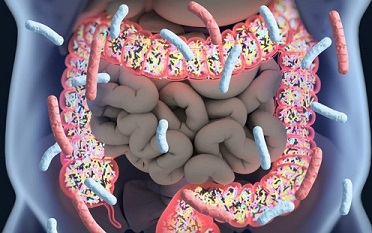Regulation of Intestinal Treg Cells Differentiation: The Crucial Role of Intracellular Iron Uptake Facilitated by the Gut Microbiome
Thailand Medical - Regulation of Intestinal Treg Cells Differentiation May 20, 2023 2 years, 9 months, 4 days, 15 hours, 31 minutes ago
The relationship between the gut microbiome and our immune system is an area of research that continues to yield fascinating results. A recent study by scientist from Westlake University, Hangzhou, Zhejiang-China, shines new light on how the microbiota in our intestines helps maintain the balance of T cells, vital players in our immune system. This groundbreaking research found that certain gut bacteria produce a short-chain fatty acid, pentanoate, that enhances the absorption of iron necessary for the differentiation of regulatory T cells (Treg cells).

Iron is a crucial element for the immune system's optimal functioning. Abnormal iron levels can trigger various immune disorders. A notable example of this relationship is observed in conditions such as Crohn’s disease, ulcerative colitis, and other inflammatory bowel diseases (IBDs), where iron levels are often low. This deficiency arises due to a combination of factors including inflammatory responses, gut microbiome dysbiosis, and intestinal lumen bleeding. Prior research has even indicated a possible inverse relationship between the progression of IBD and iron levels.
Iron-responsive elements (IREs) present in genes associated with iron homeostasis are instrumental in cell response to environmental stimuli. Interestingly, IREs are also found in genes that aren't directly related to iron homeostasis, further underscoring their significance in cell regulation.
Regulatory T cells, which express the Foxp3 lineage transcription factor, play an essential role in maintaining intestinal immune tolerance and self-tolerance. These cells undergo differentiation into effector regulatory T cells (eTregs) and diversify into various subsets based on the specific transcription factors involved. The gut microbiota continually interacts with these intestinal T cells, ensuring the sustained expression of specialized transcription factors.
To understand how iron deficiency affects immune tolerance and regulatory T cells, the study team conducted an experiment involving the depletion of the major iron transporter, transferrin receptor 1 (TfR1), from regulatory T cells.
Single-cell ribonucleic acid (RNA) sequencing was performed on total T cells isolated from female mice heterozygous for the Foxp3 gene. These mice were chosen to understand the secondary impacts of T-cell activation on the development of lethal autoimmune diseases.
The sequencing analysis revealed that a reduced percentage of T cells expressed c-Maf, a transcription factor encoded by the musculoaponeurotic fibrosarcoma gene. To validate these findings, flow cytometry was used. Bone marrow chimeric mice were then used to establish the cell-autonomous role of TfR1 in differentiating T cells expressing c-Maf.
The study found that high intracellular iron levels were critical for the differentiation of intestinal T cells. This was because iron promoted the expression of c-Maf and hypoxia-inducible factor 2-alpha (HIF-2α), both of which are essential for intestinal immune tolerance.
In a fascinating twist, the study found that the increase in iron levels within intestinal regulatory T cells was dependent on pentanoate produced by the gut microbiota. This was evidenced when the T-cell defects in mice with a depleted gut microbiota were rescued following the administration of either pentanoate or iron.
Corresponding auth
or, Dr Xing Chang from the Key Laboratory of Growth Regulation and Translational Research of Zhejiang Province, School of Life Sciences, Westlake University, told
Thailand Medical News, “These study findings hint at the potential for pentanoate to be used as a therapeutic agent to alleviate reduced immune tolerance and iron deficiencies in IBD patients. Traditionally, direct iron supplementation has been used to reduce IBD-associated anemia. However, excess iron can cause the overgrowth of pathogenic gut bacteria and oxidative stress. In comparison, pentanoate appears to safely modulate iron procurement and regulatory T-cell homeostasis, thereby easing intestinal inflammation and iron deficiency. The distinct advantage of pentanoate is that it promotes the procurement of iron without inducing an excess, thereby avoiding the associated risks.”
Pentanoate is produced by intestinal commensal bacteria, specifically Megasphaera massiliensis. Therefore, pentanoate therapy for IBD patients could take the form of either direct pentanoate supplementation or modulation of M. massiliensis, a species of gut bacteria known to produce pentanoate.
The potential therapeutic utility of pentanoate, as explored in this study, further underscores the critical role that gut microbiota play in modulating immune responses and maintaining homeostasis within our bodies.
In the context of iron regulation, commensal bacteria contribute significantly by producing pentanoate, a short-chain fatty acid (SCFA) that promotes the uptake of intracellular iron. This intricate interplay between our immune system and the gut microbiome is fascinating in itself, but it is also invaluable from a clinical perspective.
However, it is essential to note that while the data suggests promise, more research is needed to understand the full extent of the implications and to validate the potential therapies. It is crucial to understand that the DSS-induced colitis model in mice does not fully replicate all the features of human IBD, and the heterogeneity of IBD as a disease adds another layer of complexity.
That being said, the study sheds light on the significance of a well-regulated iron metabolism in maintaining immune tolerance. It also points out that our commensal bacteria, by modulating nutrient procurement, play a critical role in promoting immune tolerance. Furthermore, iron is not only essential for the differentiation of intestinal regulatory T cells but also their effector function. The iron-mediated signaling plays a complex and multifaceted role in regulating various biological processes, thus signifying the need for further research.
The study findings were published in the peer reviewed journal: Nature Communications.
https://www.nature.com/articles/s41467-023-38444-2
For the latest Medical News, keep on logging to
Thailand Medical News.
